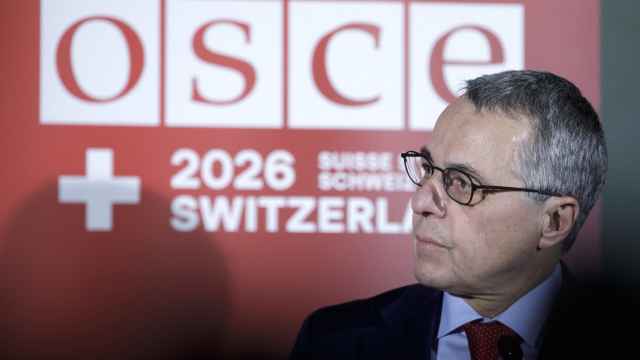The MT Conferences section did not involve the reporting or the editorial staff of The Moscow Times.

Daniil Khavronyuk
Head of Communications and PR
Raiffeisen Pension Fund
Labour Market Remains the Seller's
The Russian labour market has been increasingly the seller's market throughout the 2000-s and 2010-es, ducking for a short while below the trend in the 2008-2009 slump. The future holds little promise for employers in this regard. They will be squeezed between the hammer of the country's expanding economy (let no one be fooled by gloomy short-term GDP forecasts) and the anvil of worsening demographics.
The demographic load — a metric that shows how many dependants one worker supports — in 2010 was at its historic lows, giving the social sector a break. From that point on, the trend reverses, mostly due to the ageing population and an imbalance among different age cohorts.
2011-2013 have seen a turnaround in population decline, mostly thanks to the immigration and somewhat improving birth and death rates. At the same time, the coming 15 years will see a 10 mln decrease of the country's total workforce. In a recent research of country's employment and labour market produced by the Russian Academy of Science, experts forecast that by 2025 the economically active part of Russia's population will be about 12.9% smaller, while the total workforce will shrink by 18.5%-21%.
The Workforce Ages, Labour Supply Shrinks as Its Quality Worsens
In the nearest future, the undernumbered cohorts of Millenials born in 1990-es — 2000-es will come into play in the labour market, while the numerous 1950ers and early 1960ers — the Soviet baby-boomers — will be withdrawing.
The Russian labour market is ageing and the average worker's age has approached 40 (39.9 years in 2010). To make matters worse, the enthusiastic comers do not make up for the skilled goers.
Fine-tuning the Benefits
Compensation packages are not a one-size-fits-all affair. Its composition are a function of the team's demographics, different components targeting different age bands: a fitness/swimming pool sponsored membership will find better response with younger folks while a good medical insurance with more mature workers. As the average age structure across the market changes, employers will have to, willy-nilly, cut and carve the benefits package.
Demand for benefits that take care of post-employment life will be growing: insurance and pension products. In a fight for qualified but rapidly ageing workforce, corporate pension programme can prove a weighty bait.
Low Levels of Financial Literacy and Pension Awareness
The financial planning horizon remains short-sighted with most Russians. Coupled with the universal distrust to financial institutions, it skews the financial preferences of the general public. Real estate, hard cash and gold remain the most popular saving vehicles. Numerous reasons are cited to explain that behaviour, from cultural peculiarities to the aftershock reaction to the social and economic upheavals of the two recent decades. It must be the same aftershock that explains the sky-high yield requirements that everyone in the country seems to have to any investment product.
Despite the exponentially growing mass-media hype, financial literacy remains at low levels. As far as pensions go, our compatriots are paradoxically unknowledgeable, pessimistic and paternalistically minded: while they have no illusions about their future pension size and at the same time rely on the government for providing income in retirement.
Vox Populi
As a recent poll by NAFI, the National Agency for Financial Information, shows, 74% of respondents believe they have a general idea of their pension rights and payments, but only 30% think they know them well. Only 6% of the polled believe that their future pension will be big enough to support them in retirement. 51% are going to work after they have reached a pensionable age. Only 4% will rely on a non-state pension.
Another poll by VCIOM, the All-Russia Centre for Public Opinion Research, shows that 60% follow the changes going on in the pension system of the country. 66% believe that pension contributions must be mandatory. 48% think that the government must take care of pension savings as most people start doing that too late…
In Loco Parentis
As the polls show, low awareness is combined with a generally pessimistic outlook on the state pension system's capacity to provide a reasonable income in retirement. At the same time, a paternalistic mindset is still strongly rooted and the belief that "pension is not my headache, so let the government take care of it".
For employers, this presents both a problem (to the extent that it undermines financial stability of the workforce) and an opportunity. While the state is not ready to do more than it is doing pension-wise, the place of the Father Figure that will take care of all the financial drudgery remains vacant — employer's for the taking.
Employer's role in putting together an extra pension pot is hard to overestimate. Apart from putting extra money in, a corporate pension programme creates a savings framework, disciplining employees into making regular payments into it and making sure they are safely kept.
Closer Than You Think
The recent decade has witnessed a tangible attitude shift among the generation in the core of today's workforce, the 30-to-40-year-old tail of Generation X. Before, pension had been something remote, something about the granny or the elderly neighbours who routinely grumble and scold the government, for the payments that are never enough. Suddenly, moms and pas are retired, and pension matters sieved through into the inner circle.
Viewed closely, the size of pension payments and the resulting replacement ratio proved a sobering realisation for many — sobering enough to get them thinking. Where is my pension tax money going? Where does my pension pot sit? Should I set up a voluntary pension plan and what will this investment fetch?
Carthaginem Delendam Esse
I keep repeating with the true Roman stoicism: know all ye employers, today he who sets up a corporate pension programme (CPP), will gain manifold, as both the time and the target audience are ripe.
Country-wide, only one employer in six (or one in five, estimates vary) provides a CPP to its employees. So far a corporate-sponsored add-on to pension is not mandatory, and those employers who invest into it just like he invests into training and development and other personnel-related costs.
Launching a corporate pension programme today, the employer gets everything the early bird gets: the kudos and the glory as well as an early start over competition, enlisting to the vanguard of socially responsible employers, employers of choice. In several years companies are very likely to be mandated to shoulder extra costs of pension support, and then the money will be spent anyways, but with a much lesser fallout.
Another fine point: today, pension providers are competing for their customers and meet them way closer than halfway. When corporate pensions get to be a mass-product, the servicing terms will be streamlined and the willingness of providers to make allowances to their prospective customers will subside.
The MT Conferences section did not involve the reporting or the editorial staff of The Moscow Times.
A Message from The Moscow Times:
Dear readers,
We are facing unprecedented challenges. Russia's Prosecutor General's Office has designated The Moscow Times as an "undesirable" organization, criminalizing our work and putting our staff at risk of prosecution. This follows our earlier unjust labeling as a "foreign agent."
These actions are direct attempts to silence independent journalism in Russia. The authorities claim our work "discredits the decisions of the Russian leadership." We see things differently: we strive to provide accurate, unbiased reporting on Russia.
We, the journalists of The Moscow Times, refuse to be silenced. But to continue our work, we need your help.
Your support, no matter how small, makes a world of difference. If you can, please support us monthly starting from just $2. It's quick to set up, and every contribution makes a significant impact.
By supporting The Moscow Times, you're defending open, independent journalism in the face of repression. Thank you for standing with us.
Remind me later.





